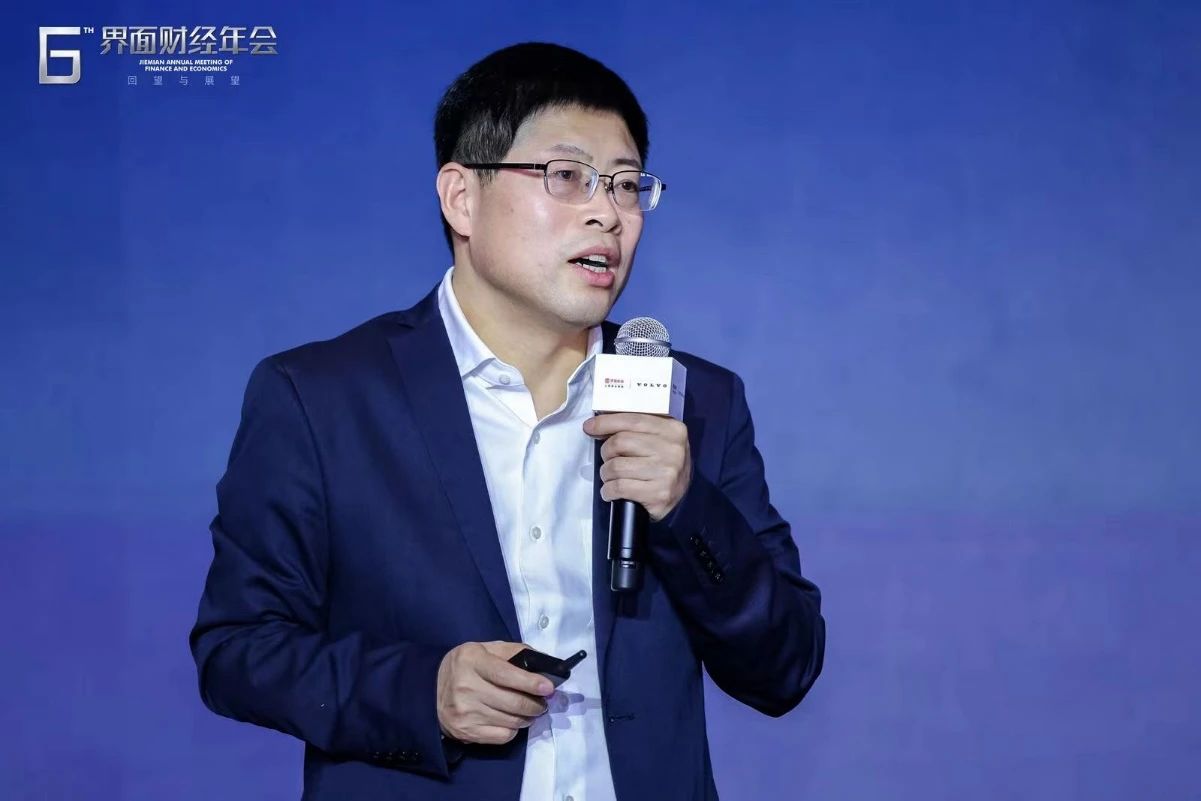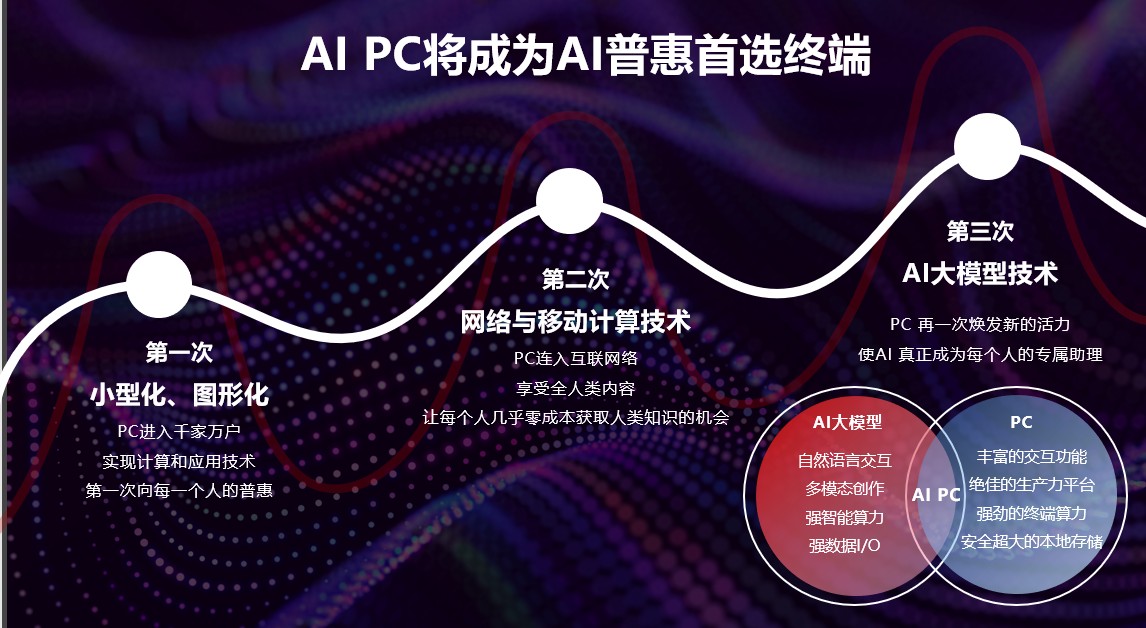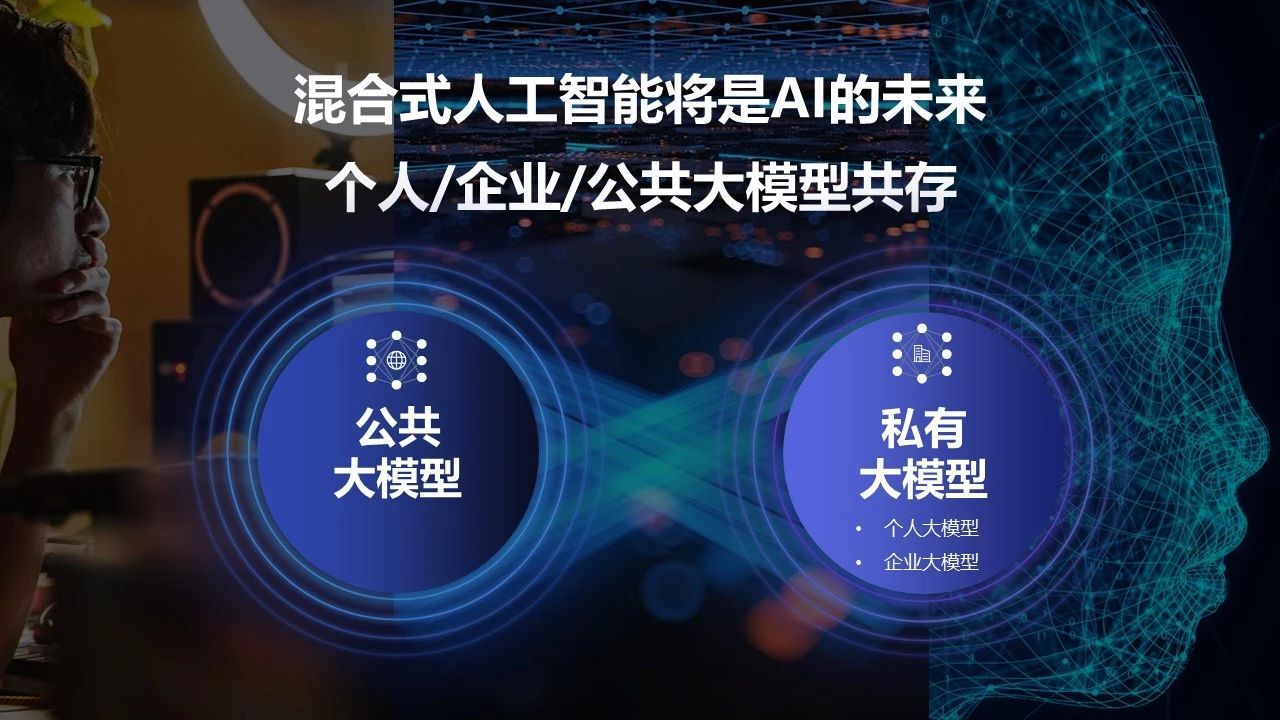PCs Emerge as the Preferred Terminal for AI Implementation, Lenovo Ushers in a New Era of AI PCs
-
In the near future, every individual and enterprise will have their own dedicated AI assistant.
Since the advent of ChatGPT last year, new generative AI applications have been emerging daily, dazzling people with their impressive demos. The rapid advancement of artificial intelligence has spurred an explosion in computing power demand, which has now become as essential as "water, electricity, and gas" in the AI era.
Faced with the overwhelming wave of AI, the public seems somewhat at a loss: these applications sound highly advanced, but how do they relate to our daily lives? Can ordinary people, who don’t understand AI models, easily use these applications? And how does the explosion in computing power bring innovative experiences to people?
"To truly achieve the democratization of AI, we must overcome multiple challenges such as personalized AI services, efficiency, cost, and security. But it’s time to face these difficulties, allowing AI to benefit our future world and help solve currently unsolvable problems," said Wang Chuandong, Vice President of Lenovo Group and Chief Marketing Officer for China, in a recent speech. He believes the future world will be one filled with interconnected intelligent agents. In the near future, every business and individual will have their own AI-driven intelligent agent. He also noted that having an intelligent agent is like having a personal assistant dedicated to helping individuals or businesses complete various tasks. Users only need to tell the agent in everyday language what they want to do, and the agent will respond with personalized actions.

It's evident that Lenovo, as the PC industry leader, has been making continuous moves since October, focusing on using AI PC as the terminal device to establish a full-stack intelligent layout. From Wang Chuandong's aforementioned speech, as well as the recently held First AI PC Industry Innovation Forum and the newly released AI PC Industry (China) White Paper, we might find the real solution for AI implementation.
The time has come to bring AI capabilities out of the ivory tower and truly integrate them into people's daily lives.
It can be said that the current "emergence" of generative AI is the collective result of the maturation of various software and hardware technologies.
On the hardware side, the rapid development of GPU technology and continuous framework updates have transformed GPUs from their original role as "graphics cards" that run 3D images faster than CPUs into general-purpose acceleration chips with high-performance computing capabilities, becoming the primary source of computing power for large model training and inference. The development and popularization of cloud computing have fully decoupled software and hardware, allowing large model developers to access large-scale computing power, storage, and network resources at relatively low costs, significantly accelerating the development process. Meanwhile, the continuous emergence of algorithms such as Transformer, AlexNet, and ResNet has provided more ideas and possibilities for the tuning and combination of large models...
When there are no longer technical barriers and applications like Runway, Pika, and ChatGPT cater to diverse scenarios, why does generative AI still feel distant from our daily lives?
One reason is the lack of user-friendly interaction models for generative AI applications. Tools like MidJourney and Pika require operations through Discord forums, and due to the vast number of model parameters, adjusting settings involves complex and varied commands. Most users who try these applications have programming experience or ample time to learn how to use them. For those without technical expertise, the barrier to entry remains high.
On the other hand, current generative AI models are all trained on public domain data, belonging to general data models, and are not yet "tailor-made." For enterprises, they need AI large models to align with their actual production to create real benefits; for individuals, they hope large models can better "understand" their language habits and usage requirements. Therefore, a "user-friendly" large model must have the ability to undergo specific training based on enterprise and personal data to meet users' personalized needs. At the same time, as the importance of data security becomes a consensus, the fine-tuning capability of large models must be based on ensuring the security of enterprise and personal privacy data.
The Lenovo AI PC Industry (China) White Paper also points out that users not only need public large model services but also require their own personal large models. Therefore, how generative AI is delivered and in what form to balance cost, user experience, and personalization has become the top issue on the path to AI inclusivity.
Terminal Manufacturers Integrate Innovation, Making AI Accessible Through PCs
"The surge in computing power in the first half of the year was on the supply side, while the current wave of AI terminals represents the demand side," said Fang Jing, Chief Analyst of the Electronics Industry at Minsheng Securities, during the 'AI New Ecosystem, Ushering in a New Era' forum.
The current hot AI market has a feeling of 'no product without AI', but among various terminals such as mobile phones, PCs, tablets, and smart wearable devices, which one can maximize the release of AI capabilities?
First, we must clarify what characteristics a qualified AI terminal needs to possess.
From a computing power perspective, the training tasks for trillion-parameter large models still need to be completed in the cloud. On the terminal side, only strong inference capabilities are required to quickly respond to user needs. Moreover, when invoking cloud-based models for inference, terminals must ensure the security of users' local data.
Mobile phones, tablets, and wearable devices are highly portable, enabling users to utilize AI capabilities anytime, anywhere. However, "small size" is a double-edged sword. While convenient for portability, it inherently means these devices cannot accommodate high-computing-power chips with large physical sizes, making it difficult to handle inference tasks for large models.
If we consider moving all inference tasks to the cloud with powerful computing capabilities, we must accept the high costs associated with cloud-based computations on one hand, and on the other, establish reasonable mechanisms to ensure that users' private data is not leaked. Additionally, since the inference results still need to be transmitted back to the terminal for output, this model also imposes high demands on network conditions. In cases of poor network connectivity, it may take tens of seconds to obtain inference results, significantly impacting the application experience.
According to the AI PC Industry (China) White Paper released by Lenovo, AI PCs will not only be hardware devices but a hybrid that includes AI models, applications, and hardware equipment. Simply put, compared to other smart terminals, AI PC terminals stand out with their full-modal human-computer interaction capabilities, all-scenario productivity platform, strongest personal computing platform, and the largest capacity secure terminal, making them the preferred terminal for carrying AI computing power.
Meanwhile, multiple segments of the AI industry chain are continuously evolving: AI large models require constant iteration, computing power needs further alignment with model requirements, and the application ecosystem needs continuous refinement. However, average users lack control over these individual components and simply want to easily obtain optimal AI application results, necessitating end devices that can comprehensively deliver AI capabilities.
Since its development in the early 1980s, the PC has developed a more complex and mature ecosystem compared to other terminal industry chains. Taking Lenovo Group, a leader in the PC industry, as an example, it has accumulated nearly 40 years of experience in the PC industry chain, leading progress in both miniaturization and network transformation. It can be said that PC manufacturers, as integrators of the previous generation of PC technology, are actually more capable of becoming technology integration innovators and hardware-software capability integrators in the AI era.
As Amu, Vice President of Lenovo Group and Vice President of China Strategy and Business Development, stated: "With its outstanding performance across all aspects, the PC has once again become the preferred terminal for making AI accessible to everyone, undertaking the historic mission of bringing a groundbreaking new AI experience to users."

Although more than 20 years have passed since the PC's significant upgrade for the internet wave, Lenovo has long secured its position as the global leader in PC shipments with its pioneering internet computers. Facing the new AI revolution, AI PC terminals continue to demonstrate boundless vitality and potential in technology.
"Considering the maturation process of the entire industry ecosystem, AI PCs will first go through an AI Ready phase, where chip architectures will be upgraded to hybrid AI architectures, accelerating AI application innovation. With the integration of personal large models, personal intelligent agents, and an open AI application ecosystem, AI PCs will rapidly advance into the AI On phase," said Amu, Vice President of Lenovo Group and Chief Strategy Officer for China.
PC manufacturers represented by Lenovo are continuously advancing AI PC functionality upgrades, focusing on providing personalized services for general scenarios, instant and reliable service responses, lower costs for large model usage, and trustworthy protection of personal data and privacy. It is reported that on December 15th, Lenovo released two AI-ready PC products: the ThinkPad X1 Carbon AI and the Lenovo Xiaoxin Pro 16 AI Core Edition, which became officially available at 15:00 the same day, with pre-orders starting simultaneously. These two products feature embedded hybrid AI computing power, innovative/enhanced AI experiences, and upgraded device experiences, signifying Lenovo Group's official entry into the AI-ready phase of AI PCs.
The potential of AI PCs is evident. Firstly, AI PCs offer the most multimodal interaction capabilities, enriching the ways users interact with AI applications. Users can engage in natural language conversations with their computers through various forms such as voice, touch, text, and gestures, rather than being limited to specific commands or syntax.
Secondly, AI PCs come standard with heterogeneous hybrid computing power (CPU+NPU+GPU). Traditional general-purpose CPUs gain AI acceleration capabilities through architectural innovations and integrating NPUs specifically optimized for neural network workloads. GPUs, in addition to accelerating game rendering, now possess the ability for large-scale data parallel computing. The collaboration of various computing chips can meet the demands of diverse forms and scales of AI workloads.
At the same time, AI PCs can directly embed personal large models. Leveraging computing power, storage, and network resources, AI PCs can deploy hybrid large model solutions primarily locally, with edge and cloud as supplements. For most localized inference tasks that can be performed offline, AI PCs have sufficient and secure storage space to quickly deploy models. For the few complex inference tasks that must be completed at the edge or in the cloud, AI PCs also have powerful network performance to quickly transmit data and inference results. More importantly, AI PCs can dynamically adjust computing loads between the device side and the cloud to achieve the lowest cost, optimal performance, and fastest response speed.

Due to the hybrid large model architecture requiring coordination between cloud, edge, and device resources, there exists risks of personal data leakage and corporate trade secret exposure. To address these security performance issues, AI PCs provide device-level protection for personal data and privacy security, achieving a "dual focus on both software and hardware" approach.
At the hardware level, AI PCs can be equipped with hardware-grade encryption chips to ensure data can only be accessed through authorized programs. At the software level, AI PCs can establish personal data security domains based on local data, implementing targeted authorization management through defined data classification levels. This enables users to enjoy device-level protection for their personal data and privacy.
In line with the hardware capabilities of PCs to support AI implementation, the market has also given sufficient recognition to the development potential of AI PCs. IDC predicts that the proportion of AI PCs in the Chinese PC market will rise rapidly in the coming years, reaching 81% by 2027 and becoming the mainstream in the PC market.
However, in the long run, AI PCs still need to advance alongside AI technology. Current AI PCs are not perfect and have room for improvement: there is a need to explore how AI-native applications provide services—whether they should operate independently or function as "plug-ins" coexisting with third-party applications. The fine-tuning capabilities of large AI models still require further development. Additionally, when users need AI to perform complex tasks, they may need to call upon different applications and models, raising the question of how to achieve coordination between different AI-native applications...
These changes cannot be achieved by any single manufacturer in the industrial chain working alone. Instead, they require an open industry ecosystem and unified industry standards as support to enable the entire ecosystem to thrive collectively.
As a leader in the PC industry, Lenovo has addressed the most critical aspect of the AI PC sector—'ecosystem capability.' Being the PC brand closest to end consumers, Lenovo was the first to recognize the unstoppable momentum of AI development and the necessity of building an AI PC ecosystem. The company has shouldered the responsibility of becoming both the standard-setter and promoter for an open AI application ecosystem.
At the AI PC Industry Innovation Forum, Wang Chuandong, Vice President of Lenovo Group and Chief Marketing Officer of China, announced the 'Lenovo AI PC Pioneer Action', inviting more software and hardware partners to join in promoting the development of AI PCs.
'This wave of transformation requires imaginative and creative people to drive it forward. As a leader in full-stack intelligence and the world's top PC brand, Lenovo will take the lead in launching the Lenovo AI PC Pioneer Action. Together with AI PC ecosystem pioneers and creative pioneers, we will initiate a series of activities under the theme 'Together with Lenovo AI PC', living up to the promise of AI and embarking on this journey together.'
